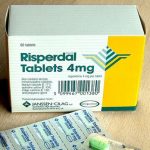Why Is Risperidone Taken At Night?

What Is Risperidone And What Does It Treat?
Risperidone is a medication that works in the brain to treat schizophrenia. It is also known as a second generation antipsychotic (SGA) or atypical antipsychotic. Risperidone rebalances dopamine and serotonin to improve thinking, mood, and behavior.
Symptoms of schizophrenia include:
• Hallucinations — imagined voices or images that seem real
• Delusions — beliefs that are not true (e.g., other people are reading your thoughts)
• Disorganized thinking or trouble organizing your thoughts and making sense
• Little desire to be around other people
• Trouble speaking clearly
• Lack of motivation
Risperidone may help some or all of these symptoms.
Risperidone is also FDA approved for the following indications:
• Acute treatment of manic or mixed episodes of bipolar disorder
• Maintenance (long-term) treatment of bipolar disorder
• Irritability associated with autistic disorders
Risperidone may also be helpful when prescribed “off-label” for adjunctive treatment of major depression disorder (risperidone is used in addition to an antidepressant), delusional parasitosis, post-traumatic stress disorder (PTSD), Tourette syndrome, and other mental health conditions. “Off-label” means that it has not been approved by the Food and Drug Administration for this condition. Your mental health provider should justify his or her thinking in recommending an “off-label” treatment. They should be clear about the limits of the research around that medication and if there are any other options.
How should Risperidone be used?
Risperidone comes as a tablet, a solution (liquid), and an orally disintegrating tablet (tablet that dissolves quickly in the mouth) to take by mouth. It is usually taken once or twice a day with or without food. Take risperidone at around the same time(s) every day. Follow the directions on your prescription label carefully, and ask your doctor or pharmacist to explain any part you do not understand. Take risperidone exactly as directed. Do not take more or less of it or take it more often than prescribed by your doctor.
Use the dropper provided to measure your dose of risperidone oral solution. You can take the oral solution with water, orange juice, coffee, or low-fat milk. Do not take the solution with tea or cola.
Do not try to push the orally disintegrating tablet through the foil. Instead, use dry hands to peel back the foil packaging. Immediately take out the tablet and place it on your tongue. The tablet will quickly dissolve and can be swallowed with or without liquid. Do not chew or crush the tablet.
Your doctor will probably start you on a low dose of risperidone and gradually increase your dose to allow your body to adjust to the medication.
Risperidone may help control your symptoms but will not cure your condition. It may take several weeks or longer before you feel the full benefit of risperidone. Continue to take risperidone even if you feel well. Do not stop taking risperidone without talking to your doctor. If you suddenly stop taking risperidone, your symptoms may return and your illness may become harder to treat.
Why Is Risperidone Taken At Night?
When taken once daily, doctors recommend that Risperidone should be taken in the evening. One study found risperidone to be safe, effective, and well tolerated even at high dosages in a once-daily dosing schedule over a prolonged period of treatment. Taking risperidone at night can also help reduce symptoms of drowsiness in people with persistent drowsiness. Risperidone causes drowsiness and you should not drive or operate machinery if risperidone has this effect on you.
How Long Does It Take For Risperidone To Work?
It is very important to tell your doctor how you feel things are going during the first few weeks after you start taking risperidone. It will probably take several weeks to see big enough changes in your symptoms to decide if risperidone is the right medication for you. If you take Risperdal Consta® (risperidone long-acting injection), it will take about three weeks before risperidone is fully absorbed and at an adequate level to begin treating your symptoms. After starting Risperdal Consta® (risperidone long-acting injection) for the first time, or re-starting it after a time of no medication, it is important to continue taking risperidone tablets for at least three weeks. If you take Perseris® (risperidone long-acting injection), it is not recommended to take oral risperidone after the first injection.
What side effects can this medication cause?
Risperidone may cause side effects. Tell your doctor if any of these symptoms are severe or do not go away:
• nausea
• vomiting
• diarrhea
• constipation
• heartburn
• dry mouth
• increased saliva
• increased appetite
• weight gain
• stomach pain
• anxiety
• agitation
• restlessness
• dreaming more than usual
• difficulty falling asleep or staying asleep
• breast enlargement or discharge
• late or missed menstrual periods
• decreased sexual ability
• vision problems
• muscle or joint pain
• dry or discolored skin
• difficulty urinating
• dizziness, feeling unsteady, or having trouble keeping your balance
Some side effects can be serious. If you experience any of the following symptoms, call your doctor immediately:
• fever
• muscle stiffness
• falling
• confusion
• fast or irregular pulse
• sweating
• unusual movements of your face or body that you cannot control
• faintness
• seizures
• slow movements or shuffling walk
• rash
• hives
• itching
• difficulty breathing or swallowing
• painful erection of the penis that lasts for hours
Risperidone may cause children to gain more weight than expected and for boys and male teenagers to have an increase in the size of their breasts. Talk to your doctor about the risks of giving this medication to your child.
Risperidone may cause other side effects. Call your doctor if you have any unusual problems while taking this medication.
What Other Medications May Interact With Risperidone?
Risperidone may block the effects of agents used to treat Parkinson’s disease such as levodopa/carbidopa (Sinemet®), bromocriptine, pramipexole (Mirapex®), ropinirole (Requip®), and others.
Risperidone may lower your blood pressure. Medications used to lower blood pressure may increase this effect and increase your risk of falling. Propranolol (Inderal®) is an example of this type of medication.
The following medications may increase the levels and effects of risperidone: divalproex sodium (Depakote®), fluoxetine (Prozac®), paroxetine (Paxil®), and verapamil (Calan®).
The following medications may decrease the levels and effects of risperidone: carbamazepine (Tegretol®, Equetro®), phenytoin (Dilantin®), phenobarbital, or rifampin (Rifadin®).





